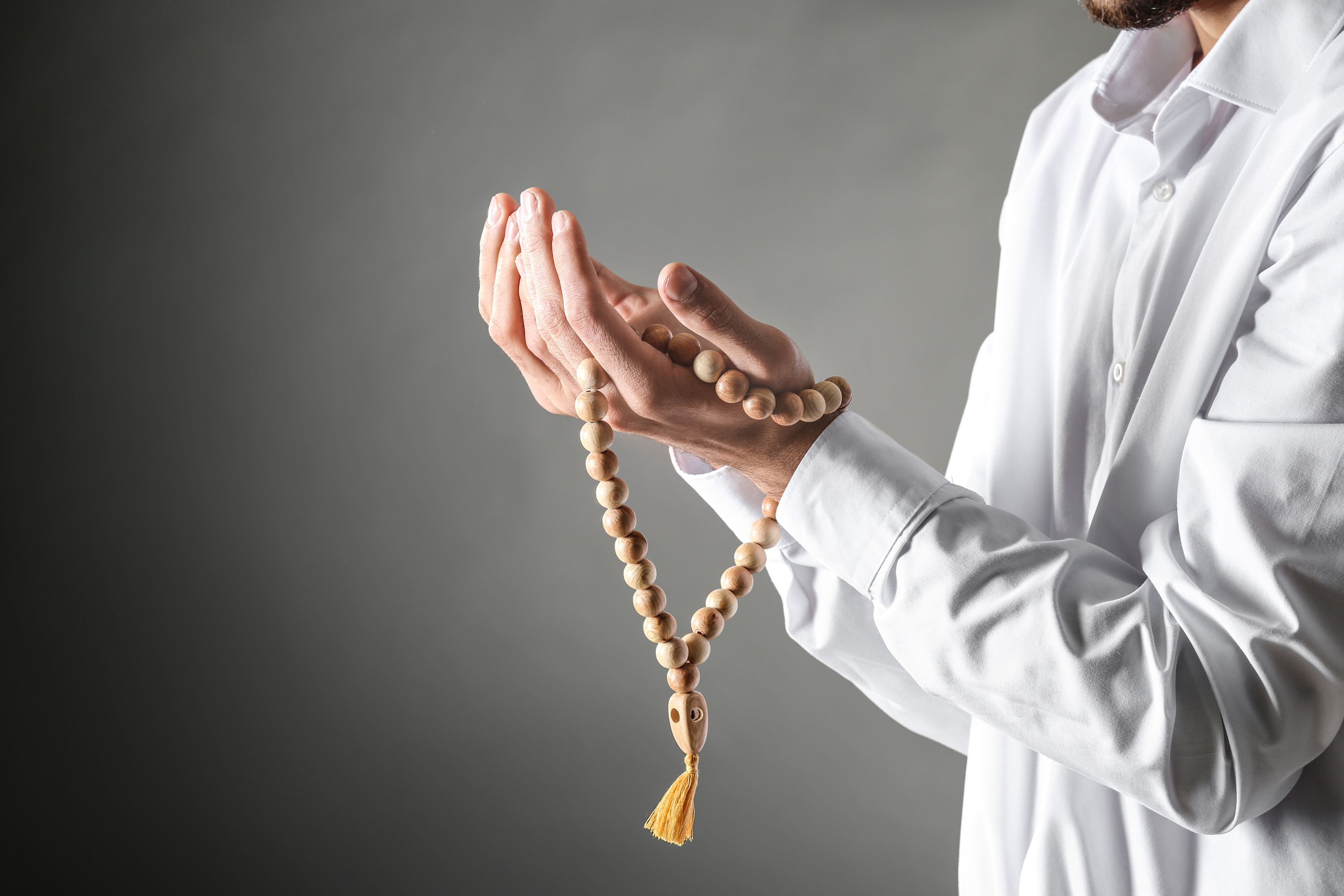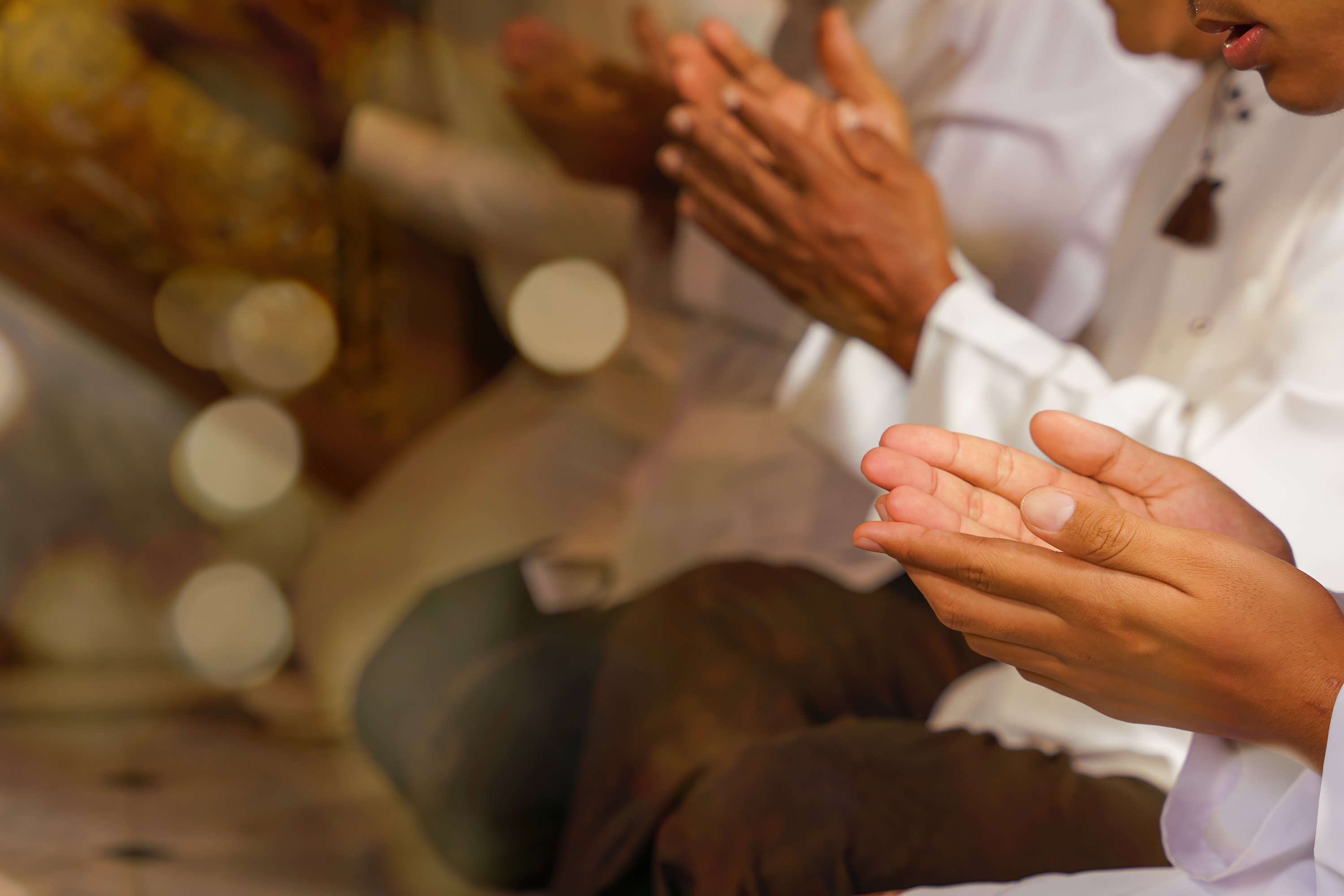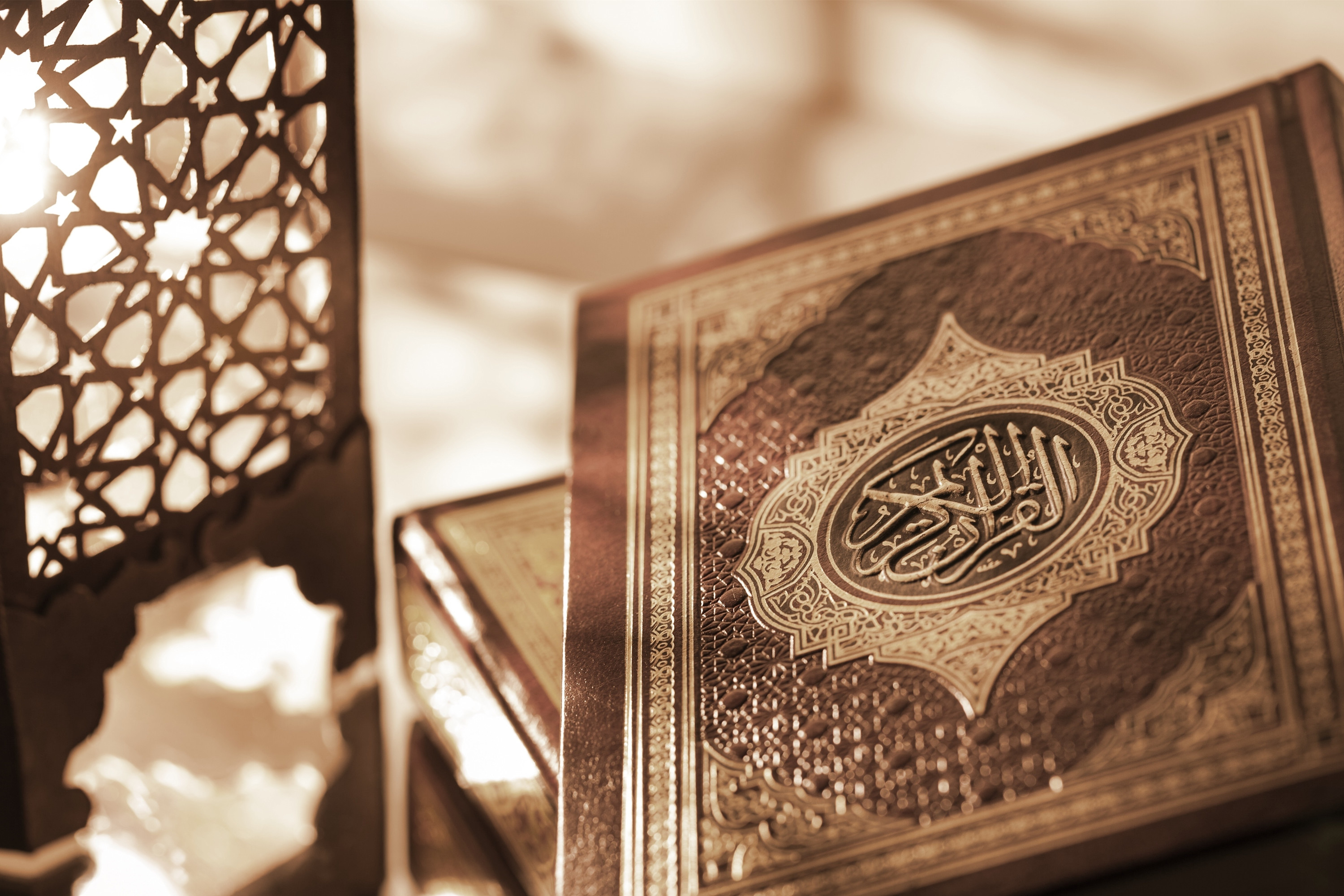
Dhikr (Remembrance of Allah)
Scholars list more than a hundred reasons, benefits and rewards for making Dhikr, but listed here are the common ten. Read and listen to everyday Duaas.
What is Dhikr?
In Arabic language, the word “Dhikr” is the noun from the verb “Dhakara”, which comes with two meanings. First, is to remember someone or something, and the second is the opposite of forgetting, which means to be mindful and emotionally present. Thus Dhikr in Islamic contexts is the remembrance of Allah (Subhanahu wa ta’ala), the Exalted, whether by merely informing about His essence, attributes, actions, or commands, or through reciting His Book (the Quran), asking Him, and making supplications to Him, or by establishing praise of Him through sanctifying, glorifying, affirming His oneness, thanking, and glorifying Him (Subhanahu wa ta’ala). While prayers and other pillars of Islam take place in specific times, locations, and situations, general Dhikr can be done with no time or location limits. However, there are specific Adhkar for specific situations, events, conditions, and times in the day and night.
Why Muslims Make Dhikr, and What are the Rewards of Dhikr?
Based on the definition above, the main purpose of Dhikr is for the Muslims to be always connected to Allah (Subhanahu wa ta’ala), internally with their hearts and orally with their tongues. Scholars list more than a hundred reasons, benefits and rewards for making Dhikr, but here are the common ten:
First:
Obeying Allah (Subhanahu wa ta’ala) command. Allah (Subhanahu wa ta’ala) connands the believers in the Quran to remember Him plentifully, and to glorify Him in the morning and in the evening.
يَـٰٓأَيُّهَا ٱلَّذِينَ ءَامَنُواْ ٱذْكُرُواْ ٱللَّهَ ذِكْرًۭا كَثِيرًۭا
وَسَبِّحُوهُ بُكْرَةًۭ وَأَصِيلًا
O believers! Always remember Allah often, and glorify Him morning and evening. (Al-Ahzab 41-42)
Second:
The Muslim is considered alive when the Muslim lives with dhikr on the tongue and in the heart. According to the Hadith of the Prophet (PBUH) dhikr makes the Muslim always connect with his Lord, which makes him alive.
قَالَ رَسُولُ اللَّهِ صَلَّى اللَّهُ عَلَيْهِ وَسَلَّمَ: مَثَلُ الَّذِي يَذْكُرُ رَبَّهُ وَالَّذِي لَا يَذْكُرُ مَثَلُ الْحَيّ وَالْمَيِّت
The messenger of Allah (PBUH) said: 'He who remembers his Lord and he who does not are like the living and the dead. (Bukhari 6407)
Third:
Dhikr is considered one of the best good deeds in Islam, even better than spending someone’s wealth, and scarifying someone’s life. The Prophet (PBUH) said:
قَالَ رَسُولُ اللَّهِ صَلَّى اللَّهُ عَلَيْهِ وَسَلَّمَ أَلَا أُنَبِّئُكُمْ بِخَيْرِ أَعْمَالِكُمْ وَأَزْكَاهَا عِنْدَ مَلِيكِكُمْ⸮ وَأَرْفَعِهَا فِي دَرَجَاتِكُمْ⸮ وَخَيْرٍ لَكُمْ مِنْ إِنْفَاقِ الذهبِ والوَرِقِ⸮ وخيرٍ لكم مِنْ أَنْ تَلْقَوْا عَدُوَّكُمْ فَتَضْرِبُوا أَعْنَاقَهُمْ وَيَضْرِبُوا أَعْنَاقَكُمْ⸮ قَالُوا: بَلَى قَالَ: ذِكْرُ اللَّهِ
Would you like me to tell you the best and purest of your deeds in the estimation of your King, those which raise your degrees highest, those which are better for you than spending gold and silver, and are better for you than that you should meet your enemy and cut off one another's head?” On receiving a reply in the affirmative he said, “It is the remembrance of God. (Tirmidhi 3377)
Fourth:
Attaining peace and tranquility in one’s heart. Remembering Allah (Subhanahu wa ta’ala) reminds Muslims that they always have Allah’s almighty protection, support and mercy which makes them feel peace and confident that whatever happened they always have Allah’s mercy, forgiveness and protection. Whatever happens to them in dunya, if they accept it with patience, they will be rewarded for it in the hereafter. Allah (Subhanahu wa ta’ala) in the Quran Says:
الَّذِينَ آمَنُوا وَتَطْمَئِنُّ قُلُوبُهُم بِذِكْرِ اللَّهِ ۗ أَلَا بِذِكْرِ اللَّهِ تَطْمَئِنُّ الْقُلُوبُ
Those who believe and whose hearts find comfort in the remembrance of Allah. Surely in the remembrance of Allah do hearts find comfort. (al-Ra’d 28)
In the same regard, the prophet (PBUH) said:
قَالَ رَسُولُ اللَّهِ صَلَّى اللَّهُ عَلَيْهِ وَسَلَّمَ لَا يَقْعُدُ قَوْمٌ يَذْكُرُونَ اللَّهَ إِلَّا حَفَّتْهُمُ الْمَلَائِكَةُ وَغَشِيَتْهُمُ الرَّحْمَةُ وَنَزَلَتْ عَلَيْهِمُ السَّكِينَةُ وَذَكَرَهُمُ اللَّهُ فَيْمَنْ عِنْدَهُ
People will not sit remembering God without the angels surrounding them, mercy covering them, tranquility descending on them, and God mentioning them among those who are with Him. (Sahih Muslim 2700)
Fifth:
Attaining forgiveness and the great reward: Allah (Subhanahu wa ta’ala) in the Quran lists the qualities of the believers, and among these qualities is the remembrance of Allah plentifully. Allah (Subhanahu wa ta’ala):
إِنَّ الْمُسْلِمِينَ وَالْمُسْلِمَاتِ وَالْمُؤْمِنِينَ وَالْمُؤْمِنَاتِ وَالْقَانِتِينَ وَالْقَانِتَاتِ وَالصَّادِقِينَ وَالصَّادِقَاتِ وَالصَّابِرِينَ وَالصَّابِرَاتِ وَالْخَاشِعِينَ وَالْخَاشِعَاتِ وَالْمُتَصَدِّقِينَ وَالْمُتَصَدِّقَاتِ وَالصَّائِمِينَ وَالصَّائِمَاتِ وَالْحَافِظِينَ فُرُوجَهُمْ وَالْحَافِظَاتِ وَالذَّاكِرِينَ اللَّهَ كَثِيرًا وَالذَّاكِرَاتِ أَعَدَّ اللَّهُ لَهُم مَّغْفِرَةً وَأَجْرًا عَظِيمًا
Indeed, the Muslim men and Muslim women, the believing men and believing women, the obedient men and obedient women, the truthful men and truthful women, the patient men and patient women, the humble men and humble women, the charitable men and charitable women, the fasting men and fasting women, the men who guard their private parts and the women who do so, and the men who remember Allah often and the women who do so - for them Allah has prepared forgiveness and a great reward. (al-Ahzab 35)
Sixth:
Shade and protection on the day of judgment. The prophet (PBUH) said in the long hadith that among the seven groups of people who will enjoy the shade and protection on the day of judgment are those whose eyes turn tearful when they remember Allah.
قَالَ رَسُولُ اللَّهِ صَلَّى اللَّهُ عَلَيْهِ وَسَلَّمَ "سَبْعَة يظلهم الله تَعَالَى فِي ظِلِّهِ يَوْمَ لَا ظِلَّ إِلَّا ظِلُّهُ
وَرَجُلٌ ذَكَرَ اللَّهَ خَالِيًا فَفَاضَتْ عَيْنَاهُ
There are seven whom God will cover with His shade on the day when there will be no shade but His, … a man who remembers God in solitude, his eyes pouring forth tears (Sahih al-Bukhari 1423)
Seventh:
Getting closer to Allah, being under the protection of Allah, and that Allah mentions the Muslim who remembers Him (Subhanahu wa ta’ala). In the Quran, Allah (Subhanahu wa ta’ala) says:
فَاذْكُرُونِي أَذْكُرْكُمْ وَاشْكُرُوا لِي وَلَا تَكْفُرُونِ
Remember me; I will remember you. And thank Me, and never be ungrateful. (al-Baqarah 152)
In addition, the prophet (PBUH) said:
يقول الله تعالى
أنا عند ظن عبدي بي⸲ وأنا معه إذا ذكرني⸲ فإن ذكرني في نفسه⸲ ذكرته في نفسي وإن ذكرني في ملإٍ ذكرته في ملإٍ خير منهم
The Messenger of Allah (PBUH) said, "Allah the Exalted says: 'I am as my slave expects me to be, and I am with him when he remembers Me. If he remembers Me inwardly, I will remember him inwardly, and if he remembers Me in an assembly, I will remember him in a better assembly (i.e., in the assembly of angels). (Sahih al-Bukhari 7405)
Eighth:
Dhikr is a protection and a shield from satan (Devil). Allah in the Quran says that, the one who does not read the Quran and remembers Allah (Subhanahu wa ta’ala) will have a devil as a close associate.
وَمَن يَعْشُ عَن ذِكْرِ الرَّحْمَٰنِ نُقَيِّضْ لَهُ شَيْطَانًا فَهُوَ لَهُ قَرِينٌ
And whoever turns a blind eye to the Reminder of the Most Compassionate, We place at the disposal of each a devilish one as their close associate (al-Zukhruf 36)
Also in the hadith of the prophet (PBUH) it is also clear that dhikr protects the Muslim from satan and nullifies the devil's effects of satan.
قَالَ رَسُولُ اللَّهِ صَلَّى اللَّهُ عَلَيْهِ وَسَلَّمَ
يَعْقِدُ الشَّيْطَانُ عَلَى قَافِيَةِ رَأْسِ أَحَدِكُمْ إِذَا هُوَ نَامَ ثَلَاثَ عُقَدٍ يَضْرِبُ عَلَى كُلِّ عُقْدَةٍ: عَلَيْكَ لَيْلٌ طَوِيلٌ فَارْقُ
فَإِنِ اسْتَيْقَظَ فَذَكَرَ اللَّهَ انْحَلَّتْ عُقْدَةٌ فَإِنْ تَوَضَّأَ انْحَلَّتْ عُقْدَةٌ فَإِنْ صَلَّى انْحَلَّتْ عُقْدَةٌ فَأَصْبَحَ نَشِيطًا طيب النَّفس وَإِلَّا أصبح خَبِيث النَّفس كسلانا
The messenger of Allah (PBUH) said, 'When one of you goes to sleep the devil ties three knots at the back of his neck, sealing every knot with, ‘You have a long night, so sleep’. So if one awakes and mentions God a knot will be loosened, if he performs ablution a knot will be loosened, and if he prays a knot will be loosened, and in the morning he will be active and in good spirits; otherwise, he will be in bad spirits and sluggish in the morning.' (Sahih al-Bukhari 1142)
In addition, in another hadith, the prophet (PBUH) was telling about the the five commands from Allah (Subhanahu wa ta’ala) to prophet (Yahya PBUH the son of Zakariya PBUH), that prophet Yahya (PBUH) said:
وآمُركم أن تَذكُروا اللهَ فإنَّ مَثلَ ذلك كمَثلِ رجلٍ خرَج العدوُّ في أثَرِه سِراعًا حتَّى إذا أتى على حِصنٍ حَصينٍ⸲ فأحرَز نفسَه منهم⸲ كذلك العبدُ لا يُحرِزُ نفسَه مِن الشَّيطانِ إلَّا بذِكْرِ اللهِ
And He commands you to remember Allah. For indeed the parable of that is a man whose enemy quickly tracks him until he reaches an impermeable fortress in which he protects himself from them. This is how the worshiper is; he does not protect himself from Satan (Ash-Shaitan) except by the remembrance of Allah. (Sahih al-Tirmidhi 2863)
Ninth:
Dhikr Allah or the remembrance of Allah plentifully protects Muslims from hypocrisy. According to the Quran, Allah (Subhanahu wa ta’ala) says about the hypocrites:
إِنَّ الْمُنَافِقِينَ يُخَادِعُونَ اللَّهَ وَهُوَ خَادِعُهُمْ وَإِذَا قَامُوا إِلَى الصَّلَاةِ قَامُوا كُسَالَىٰ يُرَاءُونَ النَّاسَ وَلَا يَذْكُرُونَ اللَّهَ إِلَّا قَلِيلًا
Surely the hypocrites seek to deceive Allah, but He outwits them. When they stand up for prayer, they do it half-heartedly only to be seen by people—hardly remembering Allah at all. (al-Nisa’ 142)
Tenth:
Entering paradise (al-Jannah) and freeing oneself from the hellfire.
Allah (Subhanahu wa ta’ala) in the Quran says that those who commit evil deeds but remember Allah and seek His forgiveness will be forgiven and will be granted paradise.
وَالَّذِينَ إِذَا فَعَلُوا فَاحِشَةً أَوْ ظَلَمُوا أَنفُسَهُمْ ذَكَرُوا اللَّهَ فَاسْتَغْفَرُوا لِذُنُوبِهِمْ وَمَن يَغْفِرُ الذُّنُوبَ إِلَّا اللَّهُ وَلَمْ يُصِرُّوا عَلَىٰ مَا فَعَلُوا وَهُمْ يَعْلَمُونَ
أُولَٰئِكَ جَزَاؤُهُم مَّغْفِرَةٌ مِّن رَّبِّهِمْ وَجَنَّاتٌ تَجْرِي مِن تَحْتِهَا الْأَنْهَارُ خَالِدِينَ فِيهَا ۚ وَنِعْمَ أَجْرُ الْعَامِلِينَ
And those who, upon committing an evil deed or wronging themselves, remember Allah and seek forgiveness for their sins—and who forgives sins except Allah?—and they do not knowingly persist in wrongdoing?. Their reward is forgiveness from their Lord and Gardens under which rivers flow, staying there forever. How excellent is the reward for those who work ˹righteousness˺! (Al Imran – 135-136)
In addition, the prophet (PBUH) said in the hadith that Allah (Subhanahu wa ta’ala) forgives those who make dhikr.
قَالَ رَسُولُ اللَّهِ صلى الله عليه وسلم
'إِنَّ لِلَّهِ مَلاَئِكَةً سَيَّاحِينَ فِي الأَرْضِ فَضْلاً عَنْ كُتَّابِ النَّاسِ فَإِذَا وَجَدُوا أَقْوَامًا يَذْكُرُونَ اللَّهَ تَنَادَوْا هَلُمُّوا إِلَى بُغْيَتِكُمْ فَيَجِيئُونَ فَيَحُفُّونَ بِهِمْ إِلَى سَمَاءِ الدُّنْيَا فَيَقُولُ اللَّهُ عَلَى أَىِّ شَيْءٍ تَرَكْتُمْ عِبَادِي يَصْنَعُونَ فَيَقُولُونَ تَرَكْنَاهُمْ يَحْمَدُونَكَ وَيُمَجِّدُونَكَ وَيَذْكُرُونَكَ
قَالَ فَيَقُولُ فَهَلْ رَأَوْنِي فَيَقُولُونَ لاَ
The Messenger of Allah (PBUH) said: “Indeed, Allah has angels who go about on the earth in addition to the Kuttab of people. So when they find groups of people remembering Allah, they call to one another: ‘Come to that which you have been seeking.’ They will come and cover them up to the lowest heaven. Allah will say: ‘What were My worshippers doing when you left them?’ They will say: ‘We left them as they were praising You, glorifying You, and remembering You.’” He (PBUH) said: “So He will say: ‘Have they seen Me?’ They say: ‘No.’
قَالَ فَيَقُولُ فَكَيْفَ لَوْ رَأَوْنِي قَالَ فَيَقُولُونَ لَوْ رَأَوْكَ لَكَانُوا أَشَدَّ تَحْمِيدًا وَأَشَدَّ تَمْجِيدًا وَأَشَدَّ لَكَ ذِكْرًا
He (PBUH) said: 'So He will say: ‘How would it be had they seen Me?’ They will say: ‘Had they seen You, they would have been more ardent in praise of You, more ardent in glorification of You, more ardent in remembrance of You.’
قَالَ فَيَقُولُ وَأَىُّ شَيْءٍ يَطْلُبُونَ قَالَ فَيَقُولُونَ يَطْلُبُونَ الْجَنَّةَ
He (PBUH) said: “So He will say: ‘And what do they seek?’” He (PBUH) said: “They will say: ‘They seek Paradise.’”
قَالَ فَيَقُولُ وَهَلْ رَأَوْهَا قَالَ فَيَقُولُونَ لاَ
He (PBUH) said: “So He will say: ‘So have they seen it?’” He (PBUH) said: “So they will say: ‘No.’”
قَالَ فَيَقُولُ فَكَيْفَ لَوْ رَأَوْهَا قَالَ فَيَقُولُونَ لَوْ رَأَوْهَا كَانُوا لَهَا أَشَدَّ طَلَبًا وَأَشَدَّ عَلَيْهَا حِرْصًا
He (PBUH) said: 'So He will say: ‘So how would it be had they seen it?’ He (PBUH) said: They will say: ‘Had they seen it, they would be more ardent in seeking it, and more eager for it.’
قَالَ فَيَقُولُ مِنْ أَىِّ شَيْءٍ يَتَعَوَّذُونَ قَالُوا يَتَعَوَّذُونَ مِنَ النَّارِ
He (PBUH) said: “So He will say: ‘So from what thing do they seek refuge?’ They will say: ‘They seek refuge from the Fire.’”
قَالَ فَيَقُولُ وَهَلْ رَأَوْهَا فَيَقُولُونَ لاَ
He (PBUH) said: “So He will say: ‘And have they seen it?’ So they will say: ‘No.’”
فَيَقُولُ فَكَيْفَ لَوَ رَأَوْهَا فَيَقُولُونَ لَوْ رَأَوْهَا كَانُوا مِنْهَا أَشَدَّ هَرَبًا وَأَشَدَّ مِنْهَا خَوْفًا وَأَشَدَّ مِنْهَا تَعَوُّذًا
He (PBUH) said: “So He will say: ‘So how would it be had they seen it?’ So they will say: ‘Had they seen it, they would be more ardent in fear of it, and more ardent in seeking refuge from it.’”
قَالَ فَيَقُولُ فَإِنِّي أُشْهِدُكُمْ أَنِّي قَدْ غَفَرْتُ لَهُمْ
He (PBUH) said: “So He will say: ‘So I do call You to witness that I have forgiven them.’
فَيَقُولُونَ إِنَّ فِيهِمْ فُلاَنًا الْخَطَّاءَ لَمْ يُرِدْهُمْ إِنَّمَا جَاءَهُمْ لِحَاجَةٍ
So they will say: ‘Indeed among them is so-and-so, a sinner, he did not intend them, he only came to them for some need.’
فَيَقُولُ هُمُ الْقَوْمُ لاَ يَشْقَى لَهُمْ جَلِيسٌ
So He will say: ‘They are the people, that none who sits with them shall be miserable.” (Sahih-Bukhari 6408)
What are the Common Adhkar and the Daily Prayers?
Dhikr has countless benefits that encompasses the best in this world (al-dunya) and in the hereafter (al-Akhirah). The coming adhkar and prayers, each has a specific meaning, and is used in a specific situation or event for a certain purpose.
Press Here to View Adkhar Without Audio
Adkhar With Audio:
Al-Ma’thurat – Prophetic supplications (adhkar) for morning and evening | |
Tags:
Tags:

Admin
Shahada services muslims to support them in the endeavor of seeking knowledge and connecting with their ummah. Shahada ai allows users to ask questions relating to Islam and receive answers backed by reliable sources of knowledge, including Quran, Hadith, Sirah, and Tafsir sources.












